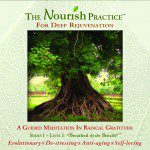28th October 2015
Contributing Writer for Wake Up World
To live a fulfilling and meaningful life, without which life is meaningless, we have to inhabit more and more our heart of hearts — our deep hearts, the center of our inner knowingness. We can tap into this knowingness if we are sensitive and can deeply feel ourselves. It is informed by our minds, yet often has a different message for us than what we think we know.
This knowingness in our heart of hearts can share with us right from wrong. This means that we are organically and inescapably accountable for what presents to us in our heart of hearts — a morality of the heart if you will.
[pro_ad_display_adzone id=”110028″]
Therefore, to live a robust, more meaningful life with less suffering, we must live deeply in our hearts. This depth, for example, is the intimacy and reckoning we experience in the dark, in the silence, deeply feeling and sensitively paying attention to what our deep body shares with our inner attention and listening. This information is largely about our personal truth, our subjective experience and path in life.
Those who act violently and unconscionably know so in their heart of hearts. To protect themselves from this painful realization, they might ignore their heart of hearts. They might have to vacate this most intimate home and source of beauty and true fulfillment. There is no need, ultimately, to punish such people, for they suffer already, if only because they cannot live peacefully in their heart of hearts.
Thus, compassion relies on our heart of hearts — compassion for ourselves and compassion for others. For, when we want to punish another, as in tit-for-tat, this registers in our heart of hearts. If we inhabit our heart of hearts, then this will not feel good, it will cause us suffering to see ourselves acting this way, because we are already paining from acting out of alignment with our deep knowing truth. Ultimately, this realization is not so much mental but at the feeling level.
We can, of course, dialogue and reason with this place inside us, to inform our heart of hearts, and shifts in that truth might occur. Ultimately, however, we have to return to what our heart of heart tells us, whispers to us, in its own vocabulary of feeling, intuition, of deep inner knowing. If we pain there for what we have done, and no reasoning alleviates or shifts it, and we still want to inhabit that deep place, then we will have to reckon with our actions. Indeed, many have moved out of their heart of hearts because of an inability to face their difficult truths. And this is to live a lie. So we must live with the courage to deeply face ourselves, which requires an uncommon courage.
To reside in our heart of hearts is our birthright and our ongoing choice, which also requires attention and great humility. Ultimately, to live here is our freedom and our greatest joy — the joy of integrity. Yet, to live in our heart of hearts means that we also have to snuggle up to our deepest heartaches. To inhabit this deep life, therefore, we have to reckon with some old ghosts, and any new ones we create today.
So, I invite you to challenge yourself, to pack up your bags and set off on the road back to your heart of hearts. To do so, begin being more honest. Begin by being more honest by spending intimate time with yourself and others, internal time, meditation time, quiet breathing time with yourself, in the quiet. Begin opening your body, stretching to release the physical tightness that squeezes your awareness out of your depths. Begin reviewing your losses, your regrets. Feel into how, and if, these events have distanced you from your heart of hearts. Begin noticing the subtle sensations, listening for the quiet yet still clear voice of your inner knowing.
Challenge yourself to be kind in the face of injustice. And if you cannot be kind, then challenge yourself to do as little damage as possible. We all have to protect ourselves, and we all react. Just be mindful of how much reactivity is truly needed and what doing so feels like later on in your heart of hearts. For, the shortcomings you enact will register in your heart of hearts. Pain done to us can be healed by embracing it and letting it be, which is its eventual letting go. But the motivated, intended pain we cause to others has lasting effects, especially if our amends cannot undo it.
Our heart of hearts is the God-spot, an embodied one, that cares for our actions and knows the way to peace, love, and justice for all. It’s not the place of sin of or condemnation, or any outer authority. Nor is this neurotic guilt, though you may feel guilt and shame until you move more fully into your heart of hearts. Sometimes we have to wrestle with ourselves, sort through our minds and challenges and tough choices. But if we stay with it, with the intent to get to the truth of our heart of hearts, it shows itself, and when it does, we know it, our whole body releases, we feel at ease, at peace. This is the noble struggle, the fight to once again embody the truth of ourselves.
The more deeply you want to live in your heart of hearts makes life worth the living. The more you listen and move into this place, the more accountable you will have to be for how you treat the rest of life. And the better you treat life and yourself, by abiding in your heart of hearts, the more truly, unspeakably joyful you stand to be. This is the inherent nature of the heart. It’s what happens inside of us whether we want it to or not.
To live from there is a journey, an art of living, a practice entirely worth living for.
Most are not in their heart of hearts, often due to a reservoir of heartaches, our past trauma. If we think this is too painful to face, we will vacate and thereby not have that deep, feeling-based morality to guide us in our actions and decisions — because we are no longer privy to what our heart of heart whispers. As a result, we do not have to be accountable to how our heart of heart feels about what we do. This allows violence, abuse, and a lack of compassion and empathy.
While we may think we are avoiding suffering by ignoring a nagging sense of wrongness in our heart of hearts, we actually perpetuate our own and others’ suffering by doing so. We not only distance ourselves from living into this deeply fulfilling and meaningful place, but we create more pain for ourselves and others by acting in ways that a deep part of us knows is not okay. The more pain created, the more walls get built in the way, and the further away we get from our heart of hearts. And this downward cycle can spiral out of control.
While reading this essay, you might have felt your heart of hearts. It might have signaled or even called to you. So, I invite you to put down this reading now, close your eyes, and feel into this place inside you and listen for what it has to tell you at this very moment. Let it breathe you and speak to you. What life is it calling you to live? What changes are you asked to make? What have you avoided for too long? How might you honor this essence of yourself connected to the rest of life?
The Nourish Practice
 Jack Adam Weber’s “The Nourish Practice” is an easy, guided meditation-Qi Gong practice in radical gratitude and self-love. It is an Earth-based, body-centered practice — at once physiological and ecological — that is deeply relaxing and replenishing, especially for modern-day burn-out syndrome, and requires little physical effort. It “resets your nervous system” and fosters a rich inner life.
Jack Adam Weber’s “The Nourish Practice” is an easy, guided meditation-Qi Gong practice in radical gratitude and self-love. It is an Earth-based, body-centered practice — at once physiological and ecological — that is deeply relaxing and replenishing, especially for modern-day burn-out syndrome, and requires little physical effort. It “resets your nervous system” and fosters a rich inner life.
You can purchase The Nourish Practice as a CD or Digital Download here.
Previous articles by Jack Adam Weber:
- The Modern Shaman: Fierce Love at the Frontier of Madness
- Arrogance in Relationships: How to Deal With and Heal It
- 11 Reasons Why Hippies (Not Psychos) Should Rule the World
- The Monsanto Years: Singer Neil Young Rips Into GMOs, Big Biz and Conformity
- ReVOLUTION: When Enough is Enough
- Sex – Truth and Dare, Pleasure and Purpose
- Relationships: The Costs of Staying When We Should Leave
- Emotional Work
- Yin Yang — Ancient Wisdom for Personal and Planetary Transformation
- Heartbreak – Loving Ourselves Through Difficult Times
About the author:
 Jack Adam Weber, L.Ac. is a Chinese medicine physician, author, celebrated poet, organic farmer, and activist for body-centered spirituality. He is also the creator of The Nourish Practice, an Earth-based rejuvenation meditation. Weber is available by phone for medical consultations and life-coaching.
Jack Adam Weber, L.Ac. is a Chinese medicine physician, author, celebrated poet, organic farmer, and activist for body-centered spirituality. He is also the creator of The Nourish Practice, an Earth-based rejuvenation meditation. Weber is available by phone for medical consultations and life-coaching.
You can connect with Jack Adam Weber at:
- Facebook: Facebook.com/JackAdamWeber
- Twitter: Twitter.com/JackAdamWeber
- Email: [email protected]
[pro_ad_display_adzone id=”110027″]







